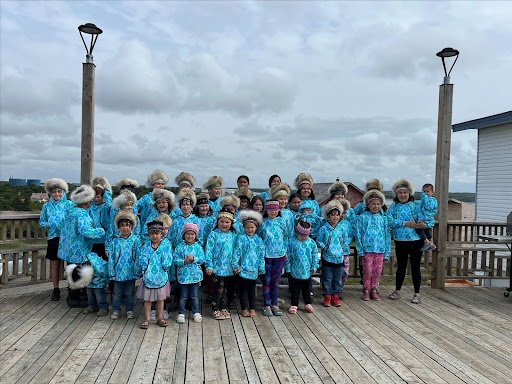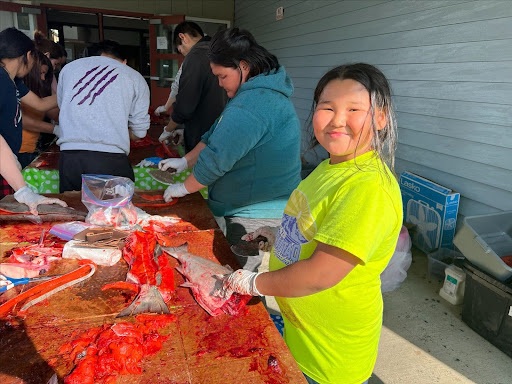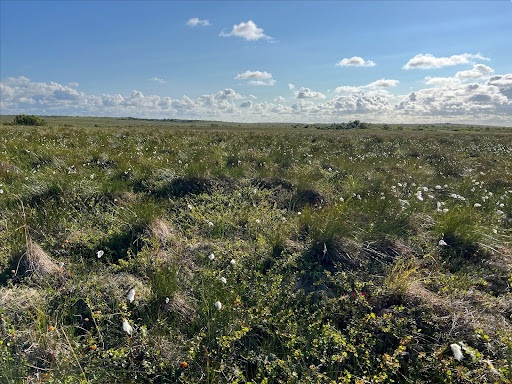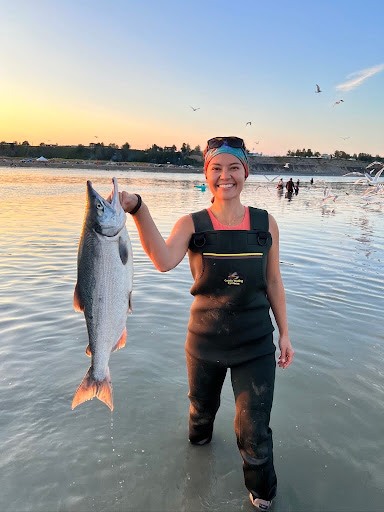
Students and adults at Naknek Culture Camp proudly wear matching qaspeqs that were made by Emily Leon over the week. The students performed a dance that they had practiced at the community potluck. Emily Brockman
Amanda Dale • October 4, 2024
We asked Bristol Bay Foundation (BBF) Program Manager Emily Brockman, who previously worked at AKHF for four years and is a FORUM writing fellow, to reflect on her first summer doing regional cultural work at BBF. Brockman manages the Bristol Bay Teaching & Learning Collaborative, a partnership between nine organizations (including AKHF) dedicated to improving the quality of teaching and growing more local teachers in the Bristol Bay Region. AKHF’s role in the partnership is overseeing a C3 program that serves 16 educators each year.

Students and adults at Naknek Culture Camp proudly wear matching qaspeqs that were made by Emily Leon over the week. The students performed a dance that they had practiced at the community potluck. Emily Brockman
1) What excites you most about the Bristol Bay Teaching & Learning Collaborative (BBTLC) Project that you manage?
Our “education cultural work” can be impossible to understand unless you are in the thick of it. Between hosting and co-hosting culture camps for students in Perryville, Manokotak, Naknek, Pedro Bay, and Port Heiden as well as an experimental career exploration program for high school students at Brooks Camp, we were absolutely immersed in the work this summer – a phenomenon I affectionately call swimming in agutak (Yup’ik version of “ice cream” that consists of Crisco, sugar, and berries).
Zooming out, what excites me most about the TLC project is seeing young people having fun and absorbing who they are in spaces that historically signal to them that they don’t belong. This includes adults, who are often seasoned educators who have served their schools for 10+ years. Witnessing a community's excitement, passion, and quite frankly, healing from their own hurt inflicted from the system is something special. Lastly, the work is flexible because it has to be. We run into unexpected challenges like a community being out of gas, cars not working, inclement weather –the list goes on. I appreciate and think it’s so valuable to be able to be completely out of control of a thing, figure out next steps, and appreciate what you do have. There is such a hunger for cultural education. Communities are starving for it.

Mother, Nica Mochin and her daughter help filet salmon at culture camp in Manokotak. Emily Brockman
2) You've said that how we bring people together is so important. Where has that shown up for you in your work?
Non-Natives or outside community members often believe that because we might be from the region or are Native means that we have an immediate in with a place. This isn’t true. It might mean that the connections are made a little easier, but it still takes mindfulness and intention. How we begin, work with, and end sets the tone that can make or break that event. We always try to start with local leadership bringing in their own ways (examples include a prayer, a dance, sharing Elder wisdom, etc) and if we can’t do that, sharing what is special or important to us with vulnerability and transparency (an example is sharing what my Elders or adults in my life shared).

Looking out at the tundra near Naknek Emily Brockman
3) You just wrapped up your first summer with BBF. What’s one thing that’s sticking with you from this past summer?
During camp, one of our knowledge bearers who had worked in the school for 15+ years shared that she was hesitant to invite us to maqi (steam bath) because she was tired from a long summer and weary of us as strangers. She said it in Yup’ik, and the general feeling is, “Ugh, I’m not feeling generous and who even are these people?” But she invited us anyway and said she was glad she did. She shared that in all her years, she had never seen the school opened to the community the way it had for culture camp. “That’s why the kids are so excited.” Her voice was filled with emotion, and I understood why.
In communities where there isn’t a lot of infrastructure or affordable things to do, a school, healthy or sick, is a heart. It can be a resource building, a mall, a theater, a place to mourn or celebrate life, a place to be together. When the doors remain shut, it sends strong messages about what that administration thinks about the community, if they are worthy of trust, or worthy at all. It was the first time she had seen the school signal that the community was worthy. Cultural education work is hard, logistically, emotionally, all of the things. There is so much burnout and often feels like educators or matriarchs are the only thing holding the fabric of a place together. In the times where I am most tired, I think about moments like this, the power that a small event has to begin to unravel decades of harm.
4) We miss you at AKHF, but we’re so happy to see you doing work that you love. Could you share a little about your transition from AKHF to BBF? Are there things you learned in your time at AKHF that have helped you in the new role?
When I saw a job posting from AKHF in 2020, the job description was something from a dream realm (it was a curriculum manager position that was intended to blend Yuuyaraq “the way of the human being” with postsecondary readiness). The first thing I saw opening the website was a photo of a Native person and a non-Native standing together, laughing in the snow. Beneath the photo was the mission, “to connect Alaskans through stories, ideas, and experiences.” It was what I wanted my ideal Alaska to look like, and connected to what I feel were some of the most valuable things I was able to glean from the Forum: How to gather people, how to weave intention into every piece of program design, an understanding that every person has perspectives and to approach those experiences with curiosity. The Forum was a place that built up my confidence and encouraged me to dream of a future beyond my own constraints.

Bristol Bay Foundation Program Manager (and former AKHF staff) Emily Brockman
To find out more about the Bristol Bay Teaching & Learning Collaborative project, visit the BBTLC homepage at https://www.bristolbayfoundation.org/bbtlc.
The Alaska Humanities Forum is a non-profit, non-partisan organization that designs and facilitates experiences to bridge distance and difference – programming that shares and preserves the stories of people and places across our vast state, and explores what it means to be Alaskan.
November 13, 2025 • MoHagani Magnetek & Polly Carr
November 12, 2025 • Becky Strub
November 10, 2025 • Jim LaBelle, Sr. & Amanda Dale